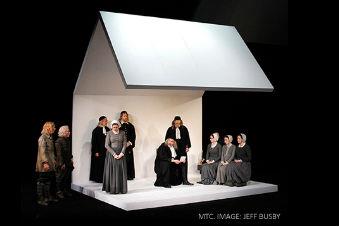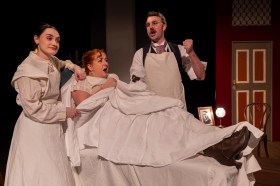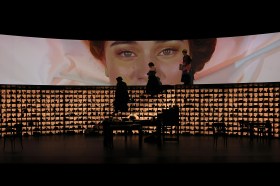A fine rendition brings out the powerful themes and skillful language of this important play.
If you have never seen The Crucible you should have booked your tickets without even reading this review. It is such an important play that, even were this not an accomplished and fitting production, it should an essential part of your theatrical literacy.
If you know the play well – or worse, remember it only as a perennial school text – then you may be, as I was, to skip yet another production of a modern classic, especially when you read that director Sam Strong plays a straight bat, bringing us an interpretation that is thoroughly authentic and solely grounded in the text.
Don’t skip it. You would be giving up an excellent night at the theatre, a production which honours one of the great texts of the 20th century and which features strong performances and tight staging.
Arthur Miller’s 1953 play is ostensibly about the mass hysteria which prompted the witch trials in Salem, Massachusetts in 1692-3, but it is famously an allegory for McCarthyism and a deeper exploration of the ethical quandary of the good person living in impossible times. In the high emotional temperature of the play, The Crucible enables us to see the metal these characters are truly made of and begs us to ask the difficult questions about how we ourselves would stand up to such trial.
The language of the work is highly controlled and stylised to reflect the colonial Puritan context and its Biblical resonances. The play demands a similarly contained production and Strong gives it to us.
Set designer Dale Ferguson and lighting designer Paul Jackson provide a sharply realised black-and-white production: the stark outline of the Puritan meeting house dominates the stage and the figures play upon it like puppets. In the first act, the use of shadows heightens the unfolding drama, as the village is inexorably drawn into the witch hunt.
A key strength of the production is in the casting. Elizabeth Nabben as the young Abigail Williams, the lead accuser, has an excellent feel for the character’s youthful self-belief and cunning. A teen Queen Bee in Puritan dress, she has the ability to draw the eye without engaging the histrionics that are ever a risk in a play that is, after all, about hysteria.
She is an excellent foil for the much more experienced David Wenham who carries the key role of John Proctor with strength and characteristic charisma, though he could go a little lighter on the glowering.
It’s a ‘talkie’ play which depends heavily on charismatic performance to hold audience attention. In the courtroom setting, Brian Lipson as Deputy Governor Danforth, holds the scene with finely attenuated delivery and a devastatingly believable arrogance.
Strong’s control was lost a little in the climactic reveal of Proctor’s’ sin and his key line was sacrificed to the sense of chaos in the court. But Proctor’s reconciliation with his wife Elizabeth (a difficult role played not entirely successfully by Anita Hegh) is beautifully staged.
A colleague suggested the production overly reverential. To me the restraint only allowed the text to speak as it should. This is no vehicle for performers but a genuine dramatisation of a powerful work which reinforces its place in the cannon.
Rating: 4 stars out of 5
Melbourne Theatre Company presents
The Crucible
By Arthur Miller
Director – Sam Strong
Set and Costume Designer – Dale Ferguson
Lighting Designer – Paul Jackson
Sound Designer/Composer – Kelly Ryall
Assistant Director – Samara Hersch
Directorial Secondment – Luke Kerridge
Cast: Julia Blake, Heather Bolton, Grant Cartwright, Paul English, Anita Hegh, Brian Lipson, Amanda McGregor, John McTernan, Elizabeth Nabben, Sarah Ogden, Naomi Rukavina, Edwina Samuels, Greg Stone, James Wardlaw and David Wenham
Southbank Theatre, The Sumner
22 June – 3 August





